Darkened lips can be a source of concern for many individuals, as it can be indicative of certain health conditions or simply be a cosmetic issue. There are a variety of factors that can cause lip darkening, including sun exposure, smoking, certain medications, and underlying medical conditions. While there are several home remedies and over-the-counter products that claim to lighten darkened lips, it's important to approach this issue with caution and seek advice from a dermatologist. In this blog, we'll discuss the common causes of lip darkening, the potential risks of using unproven treatments, and provide expert tips from dermatologists on how to safely lighten darkened lips.
Causes of dark lips
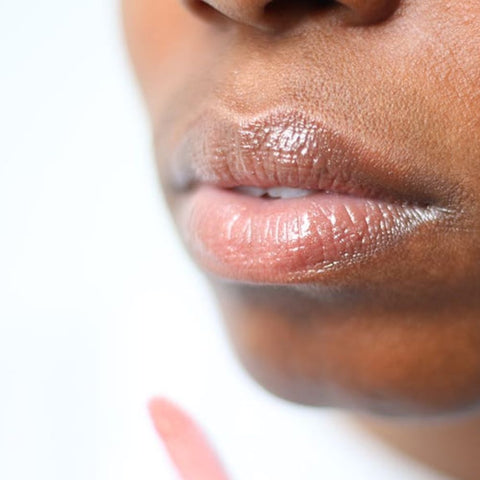
There are various factors that can cause dark lips. Here are some of the most common causes:
-
Sun exposure: Prolonged exposure to the sun can lead to pigmentation and darkening of the lips.
-
Smoking: The nicotine and tar in cigarettes can cause darkening of the lips.
-
Dehydration: Not drinking enough water can cause your lips to become dry, chapped, and dark.
-
Allergic reactions: Certain lip products, such as lipsticks, lip glosses, and lip balms, can contain allergens that cause an allergic reaction, leading to darkened lips.
-
Hormonal imbalances: Hormonal changes during pregnancy or menstruation can cause pigmentation changes in the lips.
-
Certain medications: Some medications can cause hyperpigmentation, which can affect the lips.
-
Genetics: Dark lips can also be an inherited trait.
-
Medical conditions: Certain medical conditions, such as iron deficiency anemia or eczema, can cause darkening of the lips.
If you are concerned about the color of your lips, it's always best to consult with a dermatologist or a medical professional to determine the underlying cause and the best course of treatment.
Impact of UV radiation on lip pigmentation
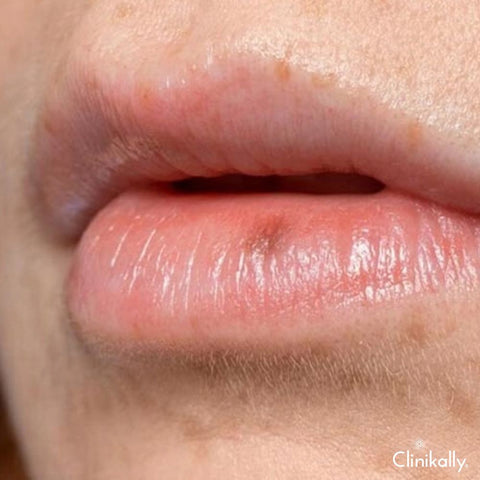
UV radiation can have a variety of effects on lip pigmentation, resulting in changes in appearance and health:
-
Prolonged UV exposure can stimulate melanin production in the lips, resulting in hyperpigmentation or darkening of the lip skin. This can cause uneven pigmentation, with some parts of the lips appearing darker than others.
-
Lips are particularly susceptible to sunburn due to their thin skin and lack of melanin, which provides natural protection against UV radiation. Sunburned lips can become red, swollen, and painful, with the potential for blistering and peeling.
-
UV radiation can contribute to the drying and chapping of the lips by depleting their natural moisture and causing dehydration. This can result in flakiness, cracking, and roughness of the lip skin, leading to discomfort and sensitivity.
-
Chronic exposure to UV radiation can accelerate the aging process of the lips, leading to the formation of fine lines, wrinkles, and loss of volume. UV radiation can break down collagen and elastin fibers in the lips, resulting in decreased firmness and elasticity over time.
-
The lips are a common site for the development of skin cancer, particularly squamous cell carcinoma and basal cell carcinoma. UV radiation exposure increases the risk of developing lip cancer, especially in individuals with fair skin and a history of sun exposure.
How smoking affects lip color
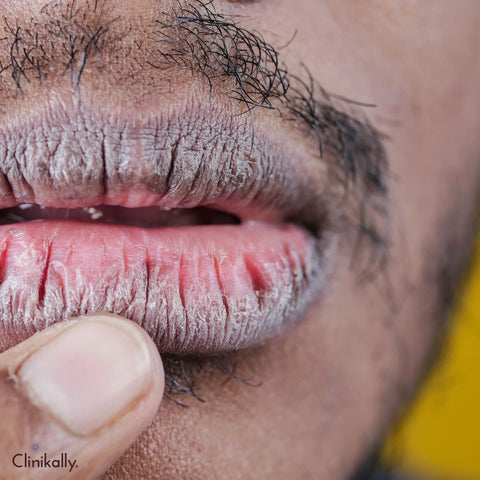
Smoking can have a variety of effects on lip colour, often resulting in noticeable changes in appearance and health.
-
Darkening or Discoloration: Smoking can cause darkening or discoloration of the lips due to the buildup of tar and other toxins in cigarette smoke. This can cause brownish or greyish lips, which may be more visible in long-term smokers.
-
Dryness and Chapping: Smoking can cause lips to become dry and chapped by depleting their natural moisture and causing dehydration. This can cause flakiness, cracking, and roughness in the lip skin, resulting in discomfort and sensitivity.
-
Wrinkles and Fine Lines: Smoking is linked to premature ageing of the skin, including the lips. The repetitive motion of puckering the lips while smoking, combined with the exposure to toxins in cigarette smoke, can cause wrinkles, fine lines, and creases around the mouth area.
-
Reduced Blood Flow: Smoking reduces blood flow to the skin, including the lips, resulting in a pale or bluish tint known as cyanosis. This is because smoking causes vasoconstriction, which narrows blood vessels and reduces oxygen and nutrient delivery to skin tissues.
-
Increased Risk of Lip Cancer: Smoking is a major risk factor for developing lip cancer, specifically squamous cell carcinoma. The carcinogenic compounds in cigarette smoke can damage the cells of the lips, leading to the formation of precancerous lesions and potentially malignant tumors over time.
The role of dehydration and lip discoloration
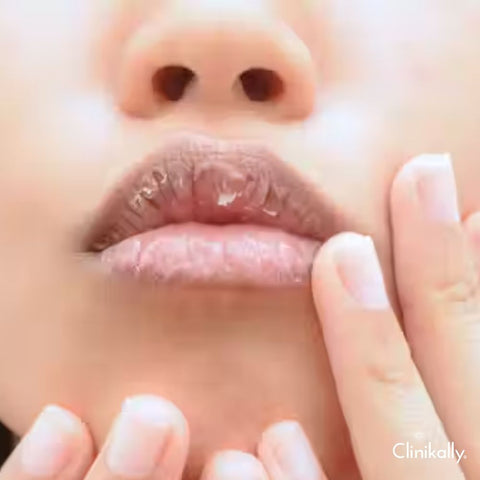
Dehydration can contribute to lip discoloration by making the lips dry, cracked, and more vulnerable to environmental factors that influence their color. Here's how dehydration can cause lip discoloration.
-
When the body is dehydrated, it lacks the fluids required to keep the skin properly hydrated, including the delicate skin on the lips. Dehydration can cause dryness and moisture loss in the lips, resulting in dryness, roughness, and flakiness.
-
Dehydrated lips are more susceptible to external factors that can change their colour, such as sunlight, wind, cold temperatures, and harsh chemicals. These environmental stressors can exacerbate dryness, causing irritation, inflammation, and lip color changes.
-
Dehydration can make the lips appear darker or more pigmented than usual for a variety of reasons, including increased melanin production, poor circulation, and the buildup of dead skin cells. Darkened lips can appear brownish, greyish, or even bluish, depending on the underlying cause.
-
Dehydration can also impair blood flow to the lips, resulting in a pale or bluish tint known as cyanosis. When the body is dehydrated, blood volume decreases and blood vessels constrict, limiting the flow of oxygenated blood to skin tissues, including the lips.
-
Dehydrated lips may also look more wrinkled, lined, or creased than well-hydrated lips. Lack of moisture can accentuate existing fine lines and wrinkles around the mouth, increasing their visibility and contributing to changes in lip texture and appearance.
Home remedies to lighten dark lips
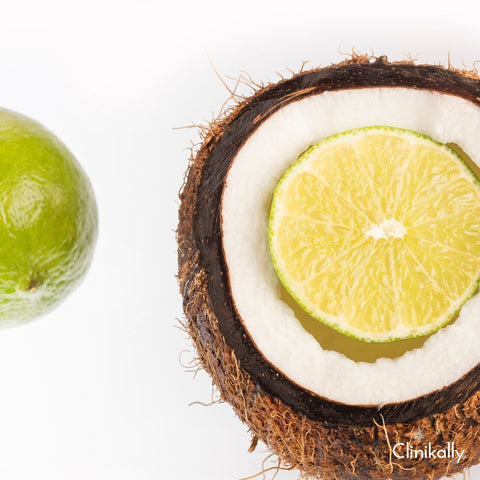
Dark lips can be caused by a variety of factors, such as excessive smoking, dehydration, sun exposure, and certain medical conditions. Here are some home remedies that may help lighten dark lips:
-
Lemon juice: Apply fresh lemon juice to your lips and leave it on for 10-15 minutes before rinsing it off. Lemon juice contains natural bleaching agents that can help lighten dark lips.
-
Sugar scrub: Mix equal parts sugar and honey to create a paste, then gently scrub your lips with the mixture for a few minutes before rinsing it off. This can help remove dead skin cells and reveal lighter, smoother lips.
-
Beetroot juice: Apply beetroot juice to your lips and leave it on for 10-15 minutes before rinsing it off. Beetroot juice contains natural colorants that can help add a pink tint to your lips.
-
Coconut oil: Apply a small amount of coconut oil to your lips and leave it on overnight. Coconut oil contains natural moisturizers that can help keep your lips hydrated and prevent further darkening.
-
Cucumber slices: Place thin slices of cucumber on your lips and leave them on for 10-15 minutes before rinsing them off. Cucumber contains natural bleaching agents that can help lighten dark lips.
It's important to note that these remedies may take time to show results and may not work for everyone. If you have severe darkening of the lips or are experiencing any pain or discomfort, it's best to consult a doctor or dermatologist.
Natural exfoliating recipes for brighter lips
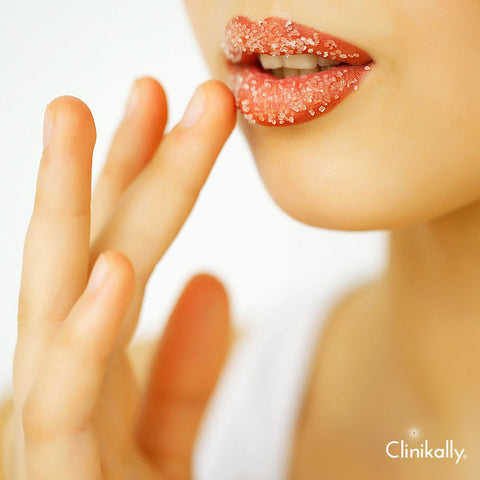
Here are some natural exfoliating recipes that use common household ingredients to brighten and soften your lips.
-
Honey and Sugar Scrub: Mix one teaspoon of honey with one teaspoon of brown sugar in a small bowl. Gently massage the mixture onto your lips in circular motions for 1-2 minutes. Rinse off with warm water and pat your lips dry. Honey is moisturizing and antibacterial, while sugar helps exfoliate dead skin cells, leaving your lips smooth and soft.
-
Coconut Oil and Coffee Grounds Scrub: Combine one teaspoon of coconut oil with one teaspoon of finely ground coffee in a bowl. Apply the mixture to your lips and gently massage in circular motions for 1-2 minutes. Rinse off with warm water and pat dry. Coconut oil moisturizes and nourishes the lips, while coffee grounds provide gentle exfoliation and help improve circulation, leaving your lips looking brighter and smoother.
-
Olive Oil and Baking Soda Scrub: Mix one teaspoon of olive oil with half a teaspoon of baking soda in a small bowl. Apply the mixture to your lips and gently massage in circular motions for 1-2 minutes. Rinse off with warm water and pat dry. Olive oil hydrates and softens the lips, while baking soda acts as a gentle exfoliant, helping to remove dead skin cells and reveal brighter, smoother lips.
-
Aloe Vera and Sea Salt Scrub: Combine one teaspoon of aloe vera gel with half a teaspoon of sea salt in a bowl. Apply the mixture to your lips and gently massage in circular motions for 1-2 minutes. Rinse off with warm water and pat dry. Aloe vera has soothing and healing properties, while sea salt provides gentle exfoliation, helping to slough off dead skin cells and promote brighter, healthier lips.
-
Lemon Juice and Honey Scrub: Mix one teaspoon of lemon juice with one teaspoon of honey in a bowl. Apply the mixture to your lips and gently massage in circular motions for 1-2 minutes. Rinse off with warm water and pat dry. Lemon juice contains natural alpha hydroxy acids (AHAs) that help exfoliate the lips and lighten dark spots, while honey moisturizes and soothes the skin, leaving your lips looking brighter and refreshed.
These natural exfoliating recipes will help you remove dead skin cells, reduce rough spots, and achieve brighter, healthier-looking lips. However, exfoliate your lips gently and avoid overdoing it, since excessive exfoliation can cause irritation and sensitivity. These lip scrubs can be used once or twice per week as part of your usual skincare routine to keep your lips clean and shiny.
Hydrating masks for lip rejuvenation
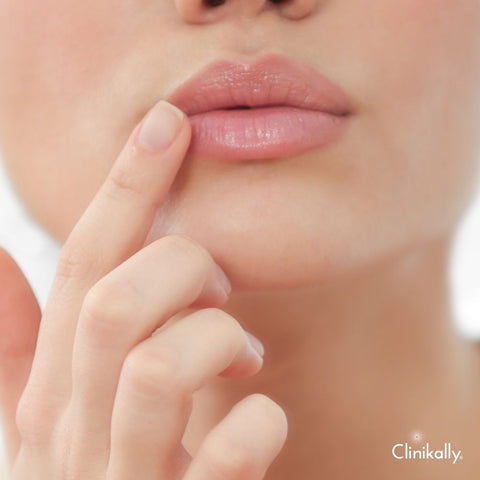
Hydrating masks can help rejuvenate and nourish your lips, leaving them soft, smooth, and moisturized. Here are some simple DIY hydrating mask recipes using natural ingredients:
-
Honey and Coconut Oil Mask: Mix one teaspoon of raw honey with one teaspoon of coconut oil in a small bowl. Apply the mixture to your lips, covering them evenly. Leave the mask on for 10-15 minutes to allow the ingredients to penetrate and hydrate the lips. Rinse off with warm water and pat your lips dry. Honey is a natural humectant that helps attract and retain moisture, while coconut oil is rich in fatty acids that nourish and soften the lips.
-
Avocado and Shea Butter Mask: Mash one-quarter of a ripe avocado in a bowl until smooth. Add one teaspoon of melted shea butter to the mashed avocado and mix well. Apply the mixture to your lips, ensuring they are fully covered. Leave the mask on for 15-20 minutes to allow the hydrating ingredients to work their magic. Rinse off with warm water and pat dry. Avocado is rich in vitamins and antioxidants that help moisturize and repair the lips, while shea butter is deeply nourishing and helps restore elasticity to dry, chapped lips.
-
Cucumber and Yogurt Mask: Grate half a cucumber and squeeze out the juice into a bowl. Add one tablespoon of plain yogurt to the cucumber juice and mix well. Apply the mixture to your lips, covering them evenly. Leave the mask on for 15-20 minutes to soothe and hydrate the lips. Rinse off with cool water and pat your lips dry. Cucumber has cooling and hydrating properties that help refresh and rejuvenate the lips, while yogurt contains lactic acid, which gently exfoliates and softens the skin.
-
Olive Oil and Vitamin E Mask: Mix one teaspoon of olive oil with the oil from one vitamin E capsule in a small bowl. Apply the mixture to your lips, massaging gently to ensure absorption. Leave the mask on overnight for maximum hydration and rejuvenation. In the morning, rinse off any remaining residue with lukewarm water and pat your lips dry. Olive oil is rich in antioxidants and fatty acids that help hydrate and nourish the lips, while vitamin E helps repair and protect the skin from damage.
Essential oils for lip lightening
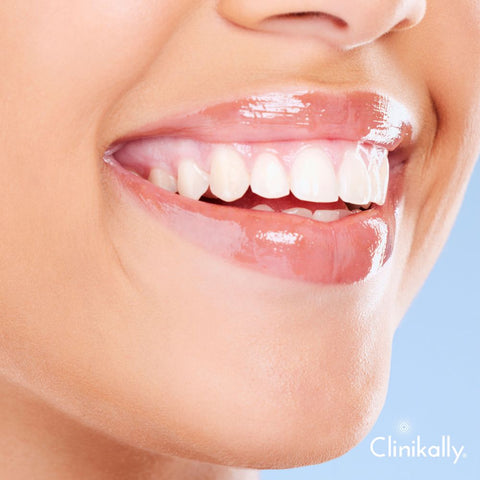
While essential oils are commonly used in cosmetics for a variety of functions, including moisturising and relaxing the skin, there is little scientific proof to back up their usefulness in whitening the lips. However, some essential oils have qualities that may benefit the overall health and appearance of the lips. Here are some essential oils that are frequently used in skincare and may have potential benefits for lip lightening:
-
Lemon Essential Oil: Lemon essential oil includes natural alpha hydroxy acids (AHAs), including citric acid, which may help exfoliate dead skin cells and brighten dark patches on the lips. However, lemon essential oil has phototoxic properties, which means it can enhance sensitivity to sunlight and cause irritation or sunburn when applied to the skin. It is critical to dilute lemon essential oil adequately and minimise sun exposure following application.
-
Lavender Essential Oil: Lavender essential oil is known for its soothing and calming characteristics, making it ideal for sensitive skin. While there is limited evidence to support lavender essential oil's efficacy for lip lightening, it may help enhance general skin health and reduce inflammation, thereby contributing to a more even skin tone over time.
-
Frankincense Essential Oil: Frankincense essential oil has been utilised in traditional medicine due to its skin-regenerating effects. It may increase cell turnover and collagen formation, resulting in a brighter, more youthful appearance of the lips. However, further research is needed to understand its precise effects on lip lightening.
-
Rose Essential Oil: Rose essential oil is prized for its hydrating and anti-inflammatory properties, which can help soothe and moisturize dry, chapped lips. While there is limited evidence to support its efficacy for lightening the lips, rose essential oil may contribute to overall lip health and hydration.
-
Carrot Seed Essential Oil: Carrot seed essential oil is rich in antioxidants, vitamins, and carotenoids, which may help protect the lips from oxidative damage and promote a more even skin tone. It's often used in skincare for its skin-brightening and rejuvenating effects.
Best lip balm to lighten dark lips
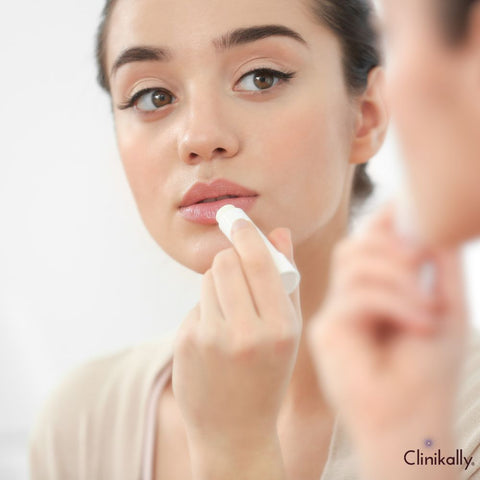
There are several lip balms that can help lighten dark lips, but the effectiveness of any lip balm in lightening dark lips depends on the cause of the discoloration. The following are some of the best lip balms for lightening dark lips:
-
Sebamed Lip Defense Triple Protection SPF 30: Sebamed Lip Defense Triple Protection SPF 30 soothes dry and chapped lips with its triple action. It contains vitamin E and plant extracts, which aid in lip regeneration. It also protects against UV rays and is appropriate for all seasons. The main benefit is that it nourishes and protects the lips from sun damage. Use twice or three times a day for the best results.
-
iS Clinical LIPROTECT SPF 35: Designed specifically for the sensitive skin of the lips, iS Clinical LIPROTECT SPF 35 provides strong, all-around protection while reducing the visual signs of pollution and photodamage. This antioxidant-rich therapy is more than just a lip balm, with gentle all-physical transparent sunscreen actives, Vitamin E and Coconut Oil to help condition lips, and Elderberry Extract and Linoleic Acid to help protect from environmental stressors.The key benefit is that it protects the lips from skin damage while hydrating, smoothing, and softening them. It protects against UVA/UVB rays on multiple levels, is rich in antioxidants and increases collagen production, and decreases erythema (sunburn). For best results, use it once or twice daily.
-
Burt's Bees Beeswax Lip Balm: Burt's Bees Beeswax Lip Balm moisturizes while conditioning the skin with beeswax. For that special refreshing tingle, add one last drop of peppermint oil. You will be left with smooth, supple lips that will have everyone talking. The main advantage is that it refreshes and nourishes your lips with responsibly sourced beeswax. It contains peppermint oil, which gives it a refreshing tingle. Beeswax, a natural skin conditioner, and Vitamin E moisturize. For best results, use it once or twice daily.
-
Dermalogica Renewal Lip Complex: Dermalogica Renewal Lip Complex is a lip treatment that improves the appearance of the lips, making them look smoother and younger, peptides and natural oils in the formula work together to help restore moisture and improve the overall texture of the lips. The main advantage is that it makes chapped, dry lips look better. Peptides and natural. The lips are rehydrated, and their overall texture is improved, using peptides and natural oils.
It's important to remember that the best way to lighten dark lips is to identify the underlying cause of the discoloration and address it. Additionally, using a lip balm with SPF can help to protect the lips from further damage and prevent them from getting darker.
Ingredients to look for in lip lightening balms
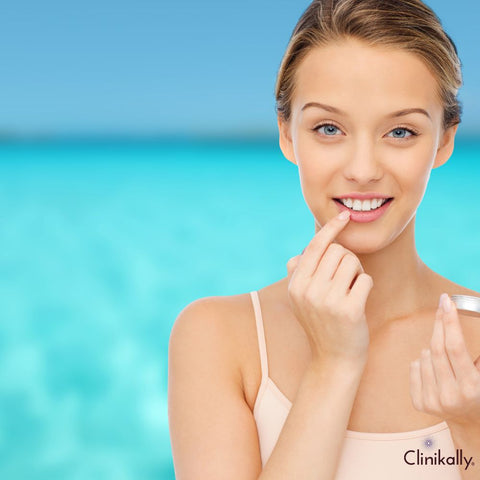
When looking for lip lightening balms, it's essential to choose products with ingredients that can effectively target hyperpigmentation, promote skin renewal, and provide hydration to the lips. Here are some key ingredients to look for in lip lightening balms:
-
AHAs such as glycolic acid and lactic acid can help exfoliate the lips, removing dead skin cells and promoting cell turnover. This can help lighten dark spots and reveal brighter, more even-toned lips.
-
Vitamin C is a potent antioxidant that can help brighten the skin and lighten dark spots, including those on the lips. Look for lip balms containing stabilized forms of vitamin C, such as ascorbic acid or vitamin C derivatives like ascorbyl palmitate or tetrahexyldecyl ascorbate.
-
Niacinamide is known for its skin-brightening properties and can help reduce the appearance of hyperpigmentation on the lips. It also helps strengthen the skin barrier and improve moisture retention, keeping the lips hydrated and healthy.
-
Licorice extract contains compounds like glabridin that can inhibit melanin production and lighten dark spots. It's a gentle yet effective ingredient for addressing hyperpigmentation on the lips and promoting a more even skin tone.
-
Arbutin is a natural skin-lightening agent derived from bearberry, cranberry, or mulberry plants. It works by inhibiting tyrosinase, an enzyme involved in melanin production, and can help fade dark spots and pigmentation on the lips.
-
Hydroquinone is a potent skin-lightening agent that works by inhibiting melanin production. While it can be effective for lightening dark spots on the lips, it's essential to use it in lower concentrations (2% or less) and under the guidance of a dermatologist to avoid potential side effects.
-
In addition to lightening agents, look for lip balms that include hydrating ingredients like hyaluronic acid, glycerin, shea butter, or coconut oil. These ingredients help to replenish moisture, relieve dryness, and keep the lips soft and supple.
-
Sun protection is essential for preventing additional darkening of the lips caused by UV exposure. Choose broad-spectrum SPF lip balms to protect your lips from harmful UV rays and sun-induced pigmentation.
When using lip lightening balms, be sure to follow the manufacturer's instructions and be patient, as results may take some time to appear. Consistent use, combined with sun protection and other preventive measures, can result in brighter, more even-toned lips over time. If you have specific concerns or are unsure about which ingredients to use, speak with a dermatologist for personalised recommendations and advice.
SPF-containing balms for lip protection
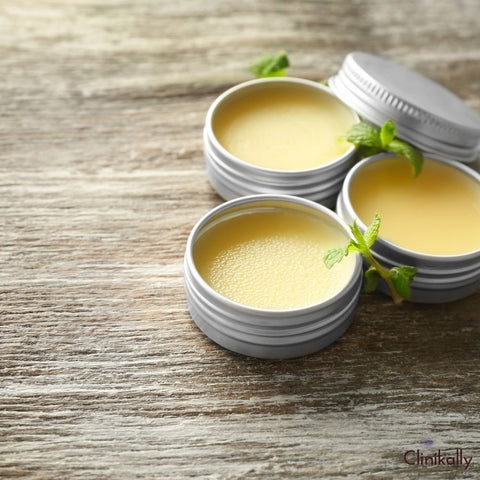
Using a lip balm with SPF is critical for protecting your lips from the sun's harmful UV rays, which can cause sunburn, premature ageing, and skin cancer. Some SPF-containing lip balms to consider for lip protection are Sebamed Lip Defense Triple Protection SPF 30, iS Clinical LIPROTECT SPF 35, Burt's Bees Beeswax Lip Balm, and Dermalogica Renewal Lip Complex. When selecting an SPF-containing lip balm, look for products labelled broad-spectrum, which means they protect against both UVA and UVB radiation. Consider your preferences for ingredients, texture, and flavour when looking for the best lip balm for you. Apply lip balm generously and reapply every two hours, or more frequently if swimming or sweating, to ensure that your lips are constantly protected.
Overnight lip treatments for intensive care
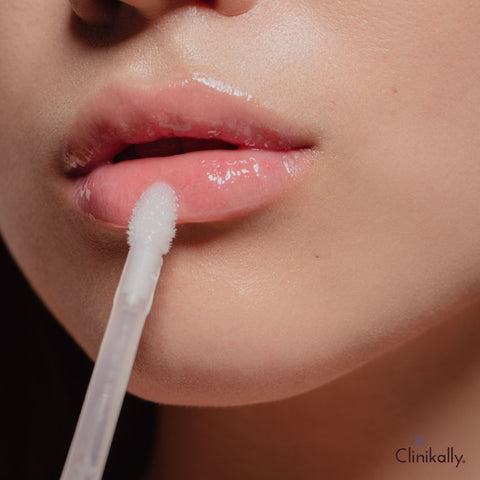
Overnight lip treatments are an excellent way to give your lips extra care and hydration while you sleep. Here are some effective overnight lip treatments to try:
-
Lip Masks: Lip masks are designed to provide intense hydration and nourishment to the lips overnight. They often contain moisturizing ingredients like hyaluronic acid, glycerin, and plant oils to replenish moisture and soften the lips. Apply a thick layer of lip mask to your lips before bedtime and leave it on overnight for maximum hydration.
-
Lip Balms with Overnight Formulas: Many lip balms come in overnight formulas that are designed to provide long-lasting moisture and repair to the lips while you sleep. Look for lip balms enriched with emollients like shea butter, cocoa butter, and coconut oil to hydrate and nourish the lips overnight. Apply a generous layer of lip balm to your lips before bedtime and reapply throughout the night as needed.
-
DIY Lip Treatments: You can also create your own DIY lip treatments using natural ingredients from your kitchen. For example, you can mix equal parts of honey and coconut oil to create a hydrating lip balm, or create a lip scrub using brown sugar and olive oil to exfoliate and soften the lips. Apply your DIY lip treatment to your lips before bedtime and leave it on overnight for intensive care.
-
Lip Serums: Lip serums are lightweight, fast-absorbing formulations that deliver concentrated ingredients to the lips for targeted treatment. Look for lip serums containing ingredients like vitamin E, peptides, and antioxidants to nourish and repair the lips overnight. Apply a few drops of lip serum to your lips before bedtime and gently massage until absorbed.
-
Occlusive Ingredients: Occlusive ingredients like petrolatum (petroleum jelly) or lanolin create a protective barrier over the lips to seal in moisture and prevent moisture loss overnight. You can apply a thin layer of petrolatum or lanolin to your lips before bedtime to lock in hydration and promote healing.
Regardless of which overnight lip treatment you choose, consistency is essential for seeing results. Incorporate your preferred treatment into your nightly skincare routine and use it frequently to keep your lips soft, smooth, and hydrated. Remember to stay hydrated throughout the day and protect your lips from harsh environmental conditions to ensure optimal lip health.
Advanced Treatments and Procedures for Dark Lips
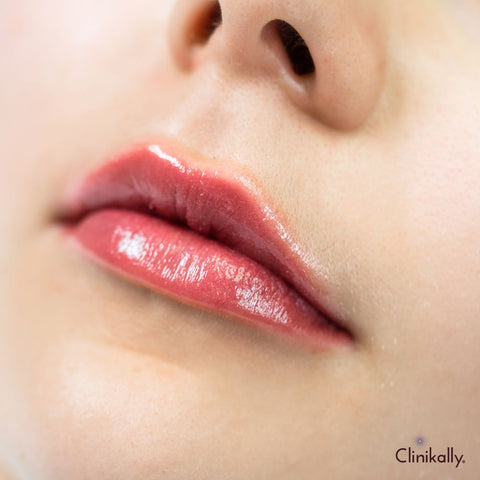
When dealing with dark lips, particularly if the colouring is persistent or severe, advanced treatments and procedures may be required to produce visible results. Chemical peels, laser therapy, microneedling, topical prescription treatments, cryotherapy, and surgical procedures are some of the choices you could examine with the help of a dermatologist or other healthcare expert. Before beginning any advanced treatments or procedures for black lips, you must consult with a skilled dermatologist or healthcare expert. They can assess your condition, recommend the best course of action, and provide personalised care to help you achieve your goals safely and successfully.
Professional lip bleaching options
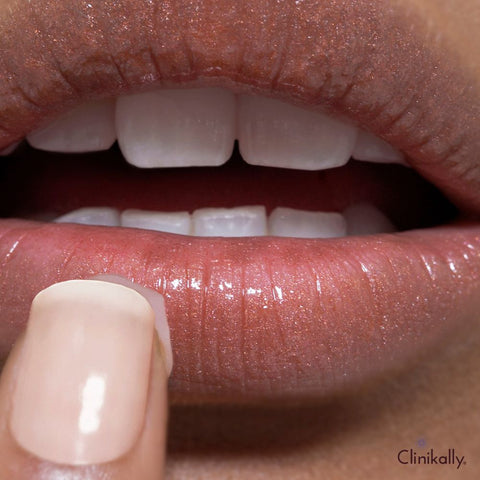
Individuals who want to lighten their dark lips can use medical-grade treatments performed by trained professionals. Here are some professional lip bleaching options that may be offered by dermatologists or cosmetic specialists:
-
Chemical Peels: Dermatologists can use ingredients like glycolic acid, salicylic acid, or TCA (trichloroacetic acid) to exfoliate the top layers of skin and lighten dark pigmentation on the lips. Superficial peels are usually safe to use on the lips, but deeper peels may require caution and professional application.
-
Laser Therapy: Laser treatments, such as fractional laser resurfacing or Q-switched laser therapy, can target melanin pigments in the lips to lighten dark spots and promote skin renewal. Laser therapy can be effective in treating hyperpigmentation, but multiple sessions may be required for best results. It's essential to consult with a dermatologist or laser specialist to determine the most suitable laser treatment for your specific needs.
-
Cryotherapy: Cryotherapy freezes the darker portions of the lips using liquid nitrogen, destroying excess melanocytes and encouraging the creation of new, lighter skin cells. Cryotherapy can be used to treat localised areas of hyperpigmentation, although it may require numerous treatment sessions and might induce transitory adverse effects such as redness and edoema.
-
Microdermabrasion: Microdermabrasion is a non-invasive exfoliation treatment that gently removes the top layers of skin using a device with a diamond-tipped wand or fine crystals. This can assist to reduce dark spots and encourage skin renewal on the lips. Several sessions may be required to produce meaningful benefits.
-
Topical Prescription Treatments: Dermatologists may recommend topical therapies comprising hydroquinone, tretinoin (retinoid), corticosteroids, or kojic acid to treat stubborn or resistant cases of lip hyperpigmentation. These treatments operate by blocking melanin formation, encouraging skin exfoliation, and reducing inflammation to gradually lighten dark spots.
-
Professional Chemical Peels: Dermatologists or cosmetic specialists may perform in-office chemical peels with larger concentrations of active chemicals, such as glycolic acid or TCA, to target deeper layers of pigmentation and achieve more dramatic lip lightening results. These peels should only be performed by qualified professionals and may necessitate downtime for recovery.
Before beginning any professional lip bleaching treatments, you must first consult with a qualified dermatologist or cosmetic specialist. They can evaluate your skin condition, discuss your treatment objectives, and recommend the best options based on your specific requirements and concerns. They can also provide personalised care and guidance throughout the treatment process, ensuring safe and effective outcomes.
Laser therapy for lip pigmentation correction
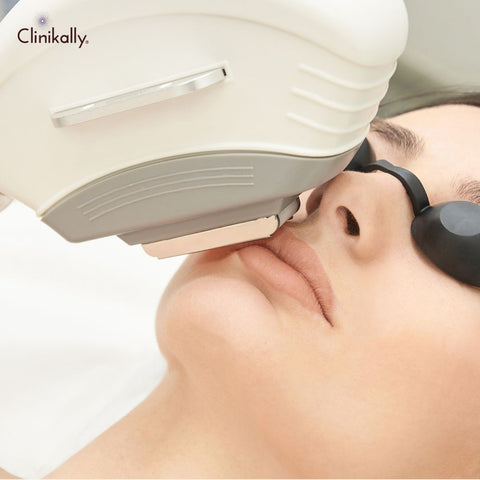
Laser therapy for lip pigmentation correction can effectively treat a variety of lip pigmentation issues, including melasma, UV damage, and post-inflammatory hyperpigmentation. However, you must contact with a trained dermatologist or laser specialist to establish whether laser therapy is appropriate for your individual needs and to ensure safe and effective treatment.
Chemical peels for brighter lip tone
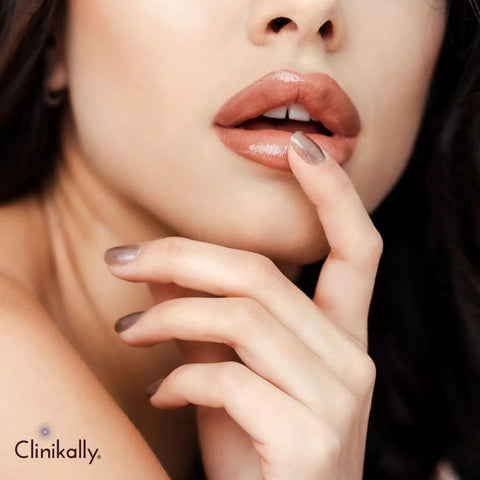
Chemical peels for brighter lip tone can help with a variety of issues, including pigmentation abnormalities, UV damage, and dullness. However, chemical peels must be performed under the direction of a skilled skincare specialist to reduce the risk of side effects and assure safe and successful therapy. They can evaluate your skin state, recommend the best sort of peel, and provide personalised treatment to help you reach your skincare objectives.
Lifestyle Adjustments for Preventing Lip Darkening
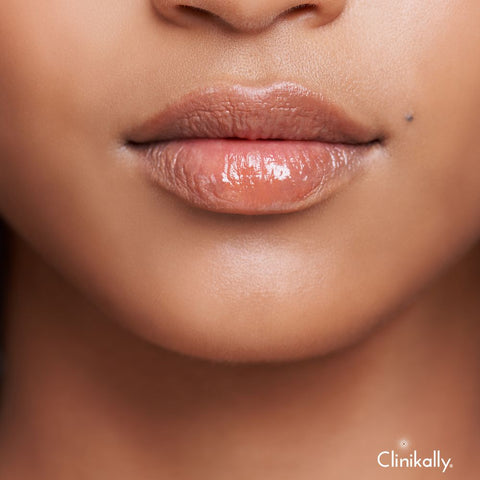
Preventing lip darkening involves a combination of lifestyle adjustments and skincare practices. Here are some tips to help maintain natural lip tone and prevent darkening:
-
Sun Protection: Protecting your lips from sun exposure is crucial for preventing darkening and pigmentation. Apply a lip balm or lipstick with SPF (sun protection factor) regularly, especially when spending time outdoors. Look for products that offer broad-spectrum protection against both UVA and UVB rays.
-
Hydration: Keep your lips well-hydrated by drinking plenty of water throughout the day. Dehydrated lips are more prone to dryness, cracking, and darkening. Additionally, use a hydrating lip balm or moisturizer to nourish and protect your lips from environmental factors.
-
Healthy Diet: Maintain a balanced diet rich in vitamins, minerals, and antioxidants to support overall skin health, including the lips. Consume plenty of fruits, vegetables, and foods high in essential fatty acids, such as fish, nuts, and seeds. Avoid excessive consumption of caffeine and alcohol, which can contribute to dehydration and lip darkening.
-
Avoid Smoking: Smoking not only affects your overall health but can also cause lip darkening over time. The chemicals in tobacco smoke can stain the lips and accelerate the aging process, leading to premature pigmentation and wrinkles. Quitting smoking or avoiding exposure to secondhand smoke can help prevent lip darkening and improve overall skin health.
-
Gentle Exfoliation: Regular exfoliation can help remove dead skin cells and promote cell turnover, resulting in smoother, brighter lips. Use a gentle lip scrub or exfoliating treatment once or twice a week to slough off dry, flaky skin and reveal a more even lip tone. Avoid over-exfoliating, as this can irritate the delicate skin on the lips.
-
Avoid Licking Your Lips: While it may provide temporary relief, licking your lips can worsen dryness and lead to darkening over time. Saliva contains enzymes that can break down the protective barrier of the lips, resulting in moisture loss and irritation. Instead of licking your lips, apply a hydrating lip balm to keep them moisturized.
-
Remove Lip Makeup Before Bed: Always remove lipstick, lip gloss, or any other lip products before bedtime to prevent product buildup, clogged pores, and potential irritation. Use a gentle makeup remover or micellar water to thoroughly cleanse your lips and allow them to breathe overnight.
-
Manage Hormonal Changes: Hormonal fluctuations, such as those experienced during pregnancy or menstruation, can sometimes contribute to lip darkening. While these changes may be temporary, maintaining a healthy lifestyle, managing stress, and following a skincare routine can help minimize their effects on lip pigmentation.
By incorporating these lifestyle adjustments into your daily routine, you can help prevent lip darkening and maintain naturally beautiful, healthy lips. Additionally, if you notice persistent or severe changes in lip coloration, consult a dermatologist or healthcare professional for further evaluation and guidance.
Diet and hydration for healthy lips
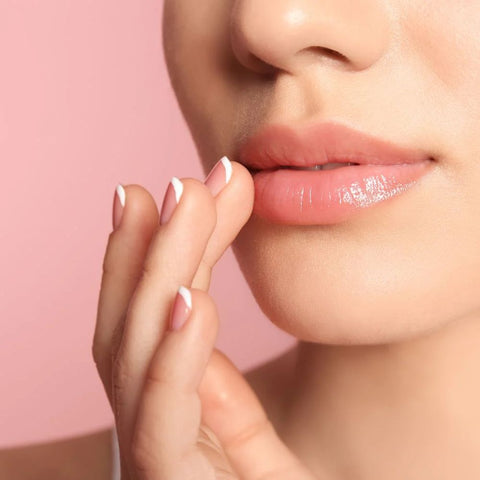
Maintaining a healthy diet and staying hydrated are critical to keeping your lips soft, smooth, and healthy. Here are some dietary and hydration tips for optimal lip health:
-
Drink Plenty of Water: Staying hydrated is essential for overall skin health, including lips. Aim to consume at least eight glasses of water per day, or more if you are physically active or live in a dry climate. Proper hydration keeps the lips moisturised from the inside out, reducing dryness and chapping.
-
Consume Omega-3 Fatty Acids: Omega-3 fatty acids, which can be found in foods such as fatty fish (salmon, mackerel, and sardines), flaxseeds, chia seeds, and walnuts, are essential for maintaining healthy skin and lips. These healthy fats help to strengthen the skin barrier, retain moisture, and reduce inflammation, resulting in smoother, suppler lips.
-
Consume Vitamin-Rich Foods: Include a variety of fruits and vegetables in your diet to ensure you are getting a diverse range of vitamins and antioxidants that promote skin health. Vitamins A, C, and E, in particular, are beneficial for collagen production, antioxidant protection, and lip health. Include foods like carrots, sweet potatoes, citrus fruits, berries, avocados, spinach, and nuts in your meals.
-
Stay Away from Dehydrating Foods and Beverages: Certain foods and beverages can dehydrate the body and contribute to dry, chapped lips. Limit your intake of caffeine, alcohol, and salty or spicy foods, as they can cause dehydration and exacerbate lip dryness. If you consume these substances, be sure to drink plenty of water to counteract their effects.
-
Use Healthy Cooking Oils: Opt for cooking oils rich in omega-3 and omega-6 fatty acids, such as olive oil, avocado oil, and coconut oil. These oils provide essential nutrients that support skin health and hydration from the inside out. Additionally, you can use these oils topically to moisturize and nourish your lips.
-
Hydrating Snacks: Eat hydrating foods such as cucumber slices, watermelon, celery sticks, and oranges to increase your water intake and keep your lips and skin hydrated all day. These foods are high in water content and contain essential vitamins and minerals that promote skin health.
-
Limit Sugary Foods: Consuming too many sugary foods and beverages can cause inflammation and contribute to a variety of skin issues, such as dryness and chapping of the lips. Limit your intake of sugary snacks, sodas, and sweets, and instead opt for healthier options such as fresh fruits or unsweetened snacks.
By incorporating these dietary and hydration tips into your daily routine, you can help keep your lips healthy, hydrated, and looking great. To achieve the best results, combine these practices with a regular lip care routine that includes moisturising lip balms or treatments. If you have specific questions about your lip health, talk to a dermatologist or healthcare professional for personalised advice and recommendations.
Quitting smoking and its impact on lip color
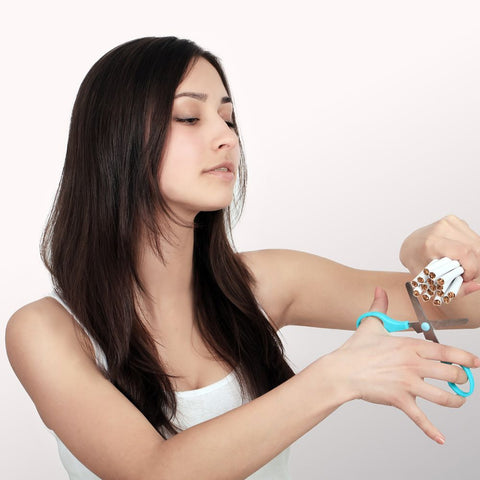
Quitting smoking can improve lip colour and overall health. Here's how quitting smoking affects lip colour:
-
Smoking can cause lip staining and discoloration due to the tar and nicotine in cigarettes. These substances can adhere to the lips over time, darkening and discolouring them. By quitting smoking, you can prevent further staining and give your lips a chance to gradually return to their natural color.
-
Smoking reduces blood flow to the skin, including the lips, which can cause a pale or bluish appearance. Quitting smoking improves blood circulation, which can gradually restore a healthier, rosier colour to the lips.
-
Smoking accelerates the ageing process and can result in premature wrinkles and fine lines around the mouth, also known as "smoker's lines." By quitting smoking, you can prevent further damage to the delicate skin around the lips and maintain a more youthful appearance.
-
Smoking can cause dryness and chapping of the lips due to the heat and chemicals in cigarettes, as well as nicotine-induced dehydration. Quitting smoking allows the lips to retain moisture more effectively and reduces the risk of dryness, flaking, and chapping.
-
Smoking is associated with various oral health problems, including gum disease, oral cancer, and leukoplakia (white patches on the lips or inside the mouth). Quitting smoking can help reduce the risk of these serious conditions and improve overall oral health, which can contribute to a healthier lip appearance.
Importance of UV protection for lips
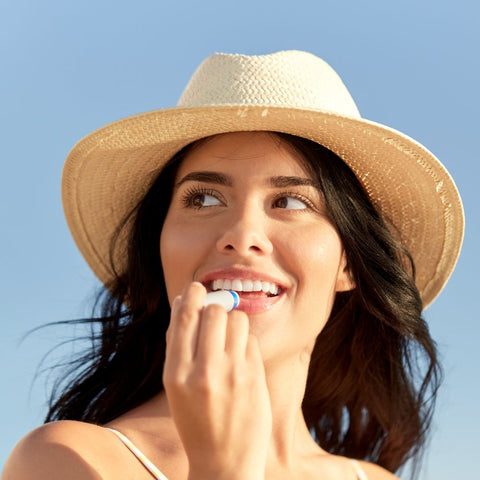
UV protection for the lips is critical for maintaining their health and appearance while also preventing a variety of lip-related issues. Here are some reasons why UV protection is important for lips: prevention of sunburn, reduction of premature ageing, prevention of hyperpigmentation, reduction of skin cancer risk, maintenance of lip health, and prevention of actinic cheilitis. To effectively protect your lips from UV rays, use a lip balm or lipstick with a broad-spectrum SPF of 30 or above. Apply liberally to your lips before sun exposure and reapply every two hours, or more frequently if swimming or sweating. Seek shade, wear a wide-brimmed hat, and avoid prolonged sun exposure during peak hours (10 a.m. to 4 p.m.) to protect your lips and skin from UV rays.
Takeaway: Get rid of dark lips for hydrated and nourished lips!
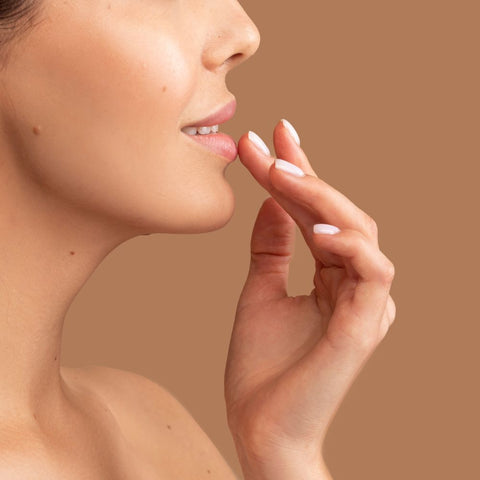
Genetics, excessive sun exposure, smoking, and dehydration are just a few of the causes of dark lips. To get rid of dark lips, it's important to hydrate and nourish your lips to restore their natural color and prevent further darkening. Here are some tips to help you get rid of dark lips:
-
Stay hydrated: Drink plenty of water throughout the day to keep your body and lips hydrated. Dehydration can make your lips dry and prone to darkening.
-
Exfoliate your lips: Use a gentle lip scrub or a soft-bristled toothbrush to exfoliate your lips and remove dead skin cells. This can help to brighten your lips and reveal smoother, softer skin.
-
Moisturize your lips: Use a lip balm or lip moisturizer to keep your lips soft and supple. Look for products that contain natural oils and butters, such as shea butter, cocoa butter, or coconut oil, which can help to nourish and hydrate your lips.
-
Protect your lips from the sun: Wear a lip balm with SPF to protect your lips from the harmful effects of the sun. Excessive sun exposure can cause your lips to darken and become discolored.
-
Quit smoking: Smoking can cause your lips to darken over time. Quitting smoking can help to improve the appearance of your lips and prevent further darkening.
By following these tips, you can get rid of dark lips and restore the natural color and health of your lips. Remember to be consistent and patient, as it may take some time to see results.

















1 comment
Odinaka ok'pondu
Was really helpful, thanks 🤝
Was really helpful, thanks 🤝